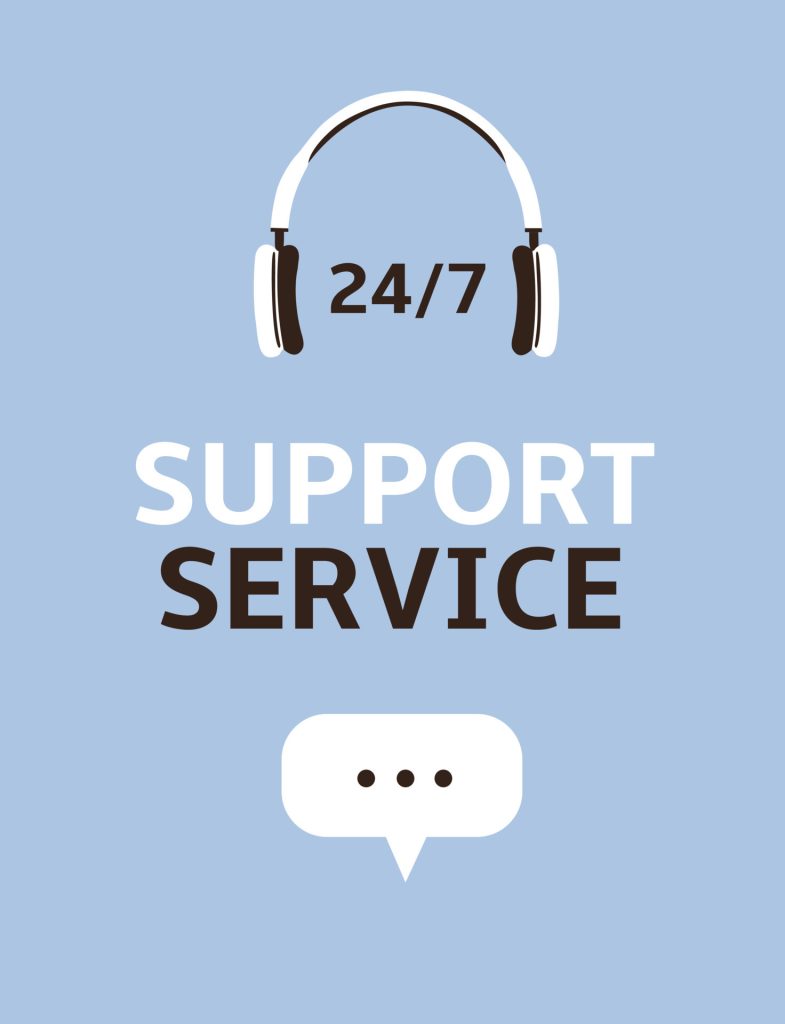In today’s fast-paced world, customer service needs extend beyond traditional business hours. 24/7 call centers have become the backbone of many organizations, offering a crucial lifeline for customers seeking assistance anytime, anywhere. This comprehensive guide explores the world of 24/7 call centers, delving into their benefits, operational structures, best practices for smooth interactions, and considerations for businesses contemplating a 24/7 model.

Demystifying 24/7 Call Centers: Advantages and Applications
A 24/7 call center operates around the clock, 365 days a year, offering uninterrupted customer support. This approach boasts several key advantages:
- Enhanced Customer Satisfaction:Customers can receive assistance whenever they need it, fostering a sense of security and improved brand loyalty.
- Global Reach:24/7 call centers cater to customers across different time zones, crucial for businesses operating internationally.
- Reduced Operational Costs:By strategically utilizing resources and leveraging technologies like call routing and self-service options, 24/7 operations can potentially lead to cost efficiencies.
- Increased Revenue Opportunities:Immediate access to support can encourage impulse purchases or expedite problem resolution, potentially boosting sales and revenue.
Here are some industries that heavily rely on 24/7 call centers:
- Technology Companies:Tech support often requires immediate attention, and 24/7 centers ensure customers can access help whenever technical difficulties arise.
- Financial Services:Whether dealing with online banking issues or credit card emergencies, 24/7 support offers peace of mind to customers.
- Travel and Hospitality:Booking inquiries, flight changes, or unexpected travel disruptions can often occur outside of traditional business hours. 24/7 call centers ensure seamless customer service in these situations.
- Healthcare:Urgent medical questions or concerns might arise at any time. 24/7 call centers staffed with qualified personnel can provide crucial initial support or direct callers to appropriate resources.
Important Note: A 24/7 call center isn’t always a one-size-fits-all solution. Consider factors like customer demographics, business needs, and call volume before implementing such a model.
Behind the Scenes: Exploring the Operational Structure of a 24/7 Call Center
Ensuring smooth operation and delivering exceptional service in a 24/7 call center environment requires a well-defined structure. Here’s a breakdown of some key components:
- Staffing:A dedicated team of call center agents is crucial. Scheduling strategies need to factor in employee well-being and ensure adequate staffing levels throughout the day and night.
- Technology:Robust call routing systems, efficient ticketing platforms, and knowledge base resources empower agents to handle inquiries efficiently.
- Training:Comprehensive training equips agents with the necessary knowledge, communication skills, and problem-solving abilities to excel in a 24/7 environment.
- Performance Monitoring:Metrics and performance tracking tools enable call center managers to identify areas for improvement and ensure consistent service quality.
Additional Considerations:
- Agent Motivation:Maintaining high morale and motivation among agents working non-standard hours is crucial. This might involve implementing flexible schedules, offering competitive compensation packages, and fostering a positive work environment.
- Security:Data security is paramount for any call center, especially when dealing with sensitive customer information. Robust security protocols and employee training on data protection are essential.
Ensuring Smooth Interactions: Best Practices for Utilizing a 24/7 Call Center
Whether you’re a customer seeking assistance or a business owner evaluating a 24/7 model, these best practices can ensure a smooth and efficient experience:
- For Customers:
- Gather Information:Before contacting a 24/7 call center, have relevant account information or details of your inquiry readily available. This can expedite the resolution process.
- Be Clear and Concise:Clearly articulate your issue or question to the agent. The more specific you are, the faster they can assist you.
- Utilize Self-Service Options:Many 24/7 call centers offer automated self-service options like FAQs or online troubleshooting guides. Explore these resources before connecting with an agent for simpler issues.
- For Businesses:
- Invest in Quality Training:Provide agents with comprehensive training that empowers them to handle diverse customer situations effectively.
- Utilize Technology Wisely:Leverage technology to streamline processes, personalize interactions, and empower agents to resolve issues efficiently.
- Emphasize Customer Focus:Instill a customer-centric culture within the call center, emphasizing empathy, active listening, and a genuine desire to help.
The Future of 24/7 Call Centers: Embracing Innovation and Evolving Customer Needs
The world of 24/7 call centers is constantly evolving, driven by technological advancements and shifting customer expectations. Here’s a glimpse into what the future might hold:
- Artificial Intelligence (AI) Integration:AI-powered chatbots and virtual assistants can handle routine inquiries, freeing human agents to focus on complex issues.
- Omnichannel Support:Seamless integration across various communication channels (phone, email, social media) will become even more crucial, offering customers a personalized and convenient support experience.
- Data Analytics for Improvement:Advanced data analytics will be leveraged to identify trends, optimize call routing, and personalize customer interactions.
- Focus on Self-Service:Self-service options like knowledge bases, interactive tutorials, and online troubleshooting guides will continue to be refined, empowering customers to find solutions independently.
Important Note: While technology plays a critical role, the human touch will remain essential in 24/7 call centers. Empathetic, well-trained agents will be key to building rapport and fostering positive customer relationships.

Conclusion: Choosing the Right Model for Your Needs
24/7 call centers offer a valuable tool for businesses seeking to enhance customer service and cater to a global audience. However, careful consideration is necessary before implementing such a model. Here are some concluding thoughts:
- Evaluate Your Needs:Analyze your customer demographics, call volume patterns, and business goals to determine if a 24/7 model aligns with your specific needs.
- Start Small & Scale Up:Consider piloting a limited 24/7 operation initially and gradually expanding based on effectiveness and customer feedback.
- Invest in Your People:Prioritize quality agent training, foster a positive work environment, and offer competitive compensation packages to retain motivated and skilled personnel.
By understanding the advantages, operational structure, best practices, and future trends associated with 24/7 call centers, you can make informed decisions. Whether you’re a customer seeking assistance or a business owner evaluating this model, this comprehensive guide has equipped you with the necessary knowledge to navigate the 24/7 call center landscape effectively.
Sources for Further Exploration:
- The International Customer Service Institute (ICSI):https://www.icsi.edu/usa/ offers valuable resources on call center best practices, agent training, and emerging trends in customer service delivery, including insights on 24/7 operations.
- The Call Center Management Association (CCMA):https://www.ccma.org.uk/ provides industry resources, research reports, and educational opportunities for professionals involved in call center management. This can be a helpful resource for businesses considering a 24/7 model.
- Customer Service Technology Review:https://www.technologyreview.com/2024/01/04/1084004/can-ai-provide-better-customer-service/ is an online publication offering insights and reviews of various customer service technologies, including those relevant to 24/7 call center operations, such as call routing software, self-service tools, and AI solutions.
By utilizing these resources and the information provided in this guide, you can gain a deeper understanding of 24/7 call centers and leverage their potential to enhance customer service and achieve your business goals.